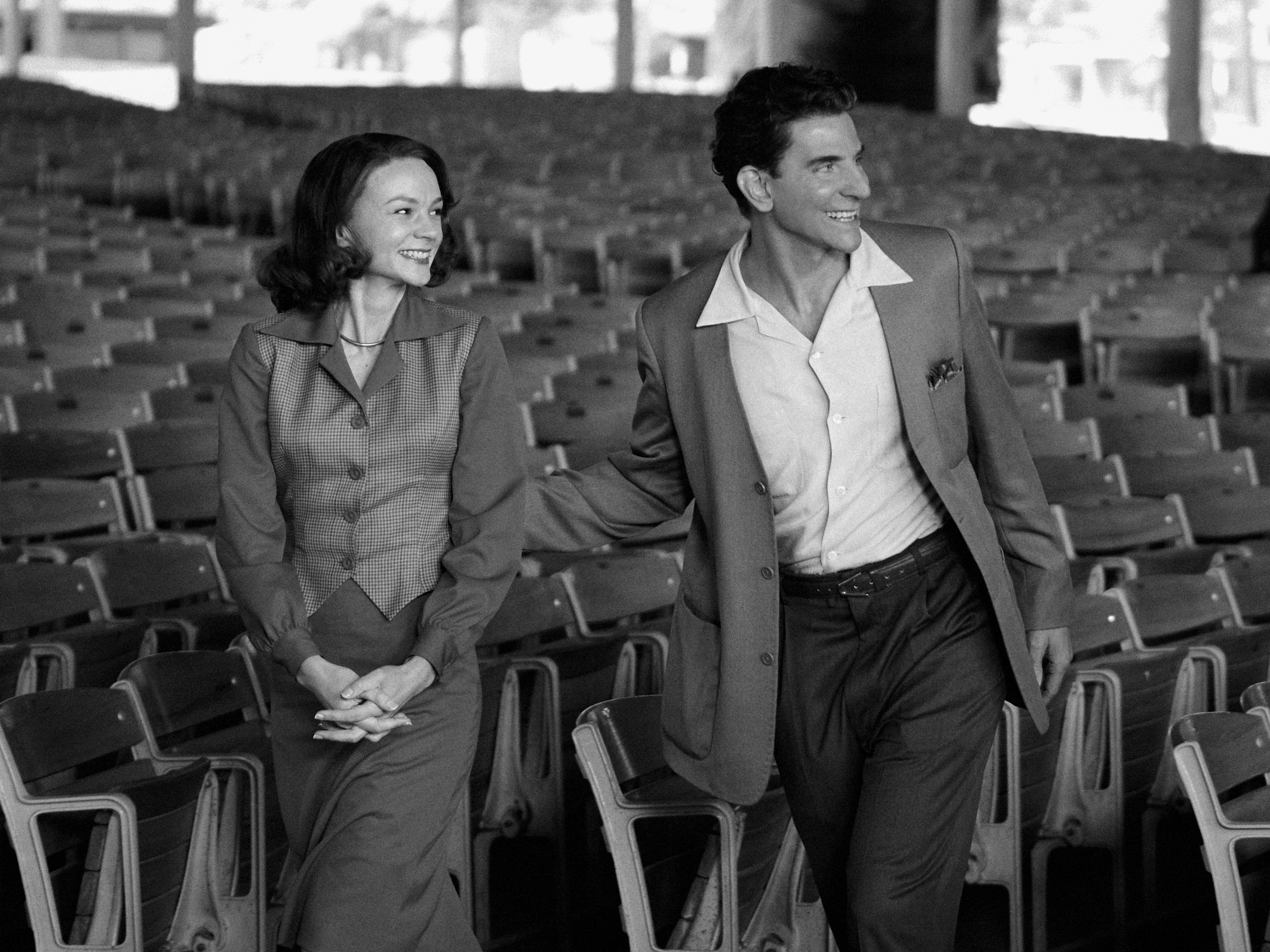
On Tuesday, Netflix released the first trailer for Maestro, its upcoming Leonard Bernstein drama directed, co-written by, and starring Bradley Cooper. The actor’s appearance in the first glimpse of footage quickly reignited a topic of conversation that arose back in May 2022 when the first stills of the movie were released, due to Cooper's facial prosthetics, which some alleged were unnecessary and constituted a troubling example of “Jewface.”
The movie is centered around the iconic composer and his relationship with Felicia Montealegre (played by Carey Mulligan), whom he married in 1951. Maestro, which also counts Steven Spielberg and Martin Scorsese among its producers, is set to premiere at the Venice Film Festival which begins at the end of this month. It will be released in select theaters on Nov. 22 and on Netflix on Dec. 20.
On Wednesday, Bernstein’s children Jamie, Alexander, and Nina Bernstein posted a statement to his official Twitter account stating that they are “perfectly” fine with Cooper’s use of “makeup to amplify his resemblance” and “we’re also certain that our dad would have been fine with it as well.” They pointed to their own involvement in the film and “the profound respect and yes, the love that Bradley brought to his portrait” of their parents.
Cooper as Bernstein
In the movie, Cooper portrays the famed composer, who is perhaps best known for composing the music for West Side Story alongside lyricist Stephen Sondheim. The focus of the drama is Bernstein's 27-year relationship with Montealegre, who died in 1978. (Bernstein died later, in 1990.) In a June 2022 interview with Kveller, Bernstein’s daughter Jamie said that she felt the backlash to Cooper’s portrayal of her father was “ridiculous.” She told the publication, “Bernstein had a big nose and yes, he was Jewish. And what is the problem here? Are we really going to say they had to hire a Jewish actor to play [my father]?”
Despite Bernstein’s family’s support for the film, however, many users on social media expressed their distaste for the decision. One user replied to Netflix’s post sharing the trailer with photos of Cooper and Bernstein side-by-side and wrote, “This isn’t about making a non-Jewish actor look more like Leonard Bernstein; it’s about making a non-Jewish actor look more like a Jewish stereotype.”
Another user said, “Let’s talk about how prevalent of a trope it still is that Jews have big noses, even though nose diversity runs the gamut among Jews as much as any other group.” The user continued, “And here we are… enhancing a shnoz prosthetic for no apparent reason, reinforcing the stereotypes. What a putz.”
Jake Gyllenhaal, whose mother is Jewish, told Deadline in 2021 that he and Cooper had competing Bernstein projects, but the latter officially got the rights to the story in the end.
Reigniting a longstanding debate
This is not the first time debate has arisen surrounding whether only actors of a certain ethnicity or marginalized group should portray characters with the same background. Most recently, the movie Golda, due to release later this month, received backlash for star Helen Mirren’s significant makeup and prosthetics to play the Israeli prime minister. The film’s director, Guy Nattiv, defended his decision to cast Mirren, telling The Daily Mail, “If someone who’s not Jewish can’t play Jewish, does someone who’s Jewish play someone who’s not Jewish?”
Spielberg saw pushback when he cast non-Jewish actors, Paul Dano and Michelle Williams, to play his parents in last year’s semi-autobiographical film The Fabelmans, although the fact that he himself was casting his own parents made it easier to shake criticism. When Kathryn Hahn, who is not Jewish (and also played a rabbi on the TV series Transparent), was cast to play Joan Rivers in a series, the conversation surged again. (The show didn’t end up moving forward due to issues with Rivers’ life rights.)
Referencing other instances of non-Jewish actresses cast to play Jews, including Rachel Brosnahan in The Marvelous Mrs. Maisel and Rachel McAdams as an Orthodox woman in Disobedience, Sarah Seltzer explained in TIME why it’s difficult to talk about these issues as they relate to Judaism. “It’s not exactly racism or cultural appropriation, because Jewishness does not fall neatly into the categories of race, religion or ethnicity—some consider it one or another or some combination of the three—and because white Jews have access to white privilege in America … Jewish actresses like [Rachel] Weisz, Natalie Portman and Scarlett Johansson are among Hollywood’s most feted stars. When a white actor or actress snags a role written for another race or ethnicity—like Johansson herself in The Ghost in the Shell—it’s blatant erasure. This isn’t that.”
Maestro, which is Cooper’s directorial follow-up to A Star Is Born, is certainly poised to remain in the conversation for many months to come, from Venice to its streaming debut in December and likely well into awards season in 2024.
More Must-Reads From TIME
- The 100 Most Influential People of 2024
- How Far Trump Would Go
- Why Maternity Care Is Underpaid
- Scenes From Pro-Palestinian Encampments Across U.S. Universities
- Saving Seconds Is Better Than Hours
- Why Your Breakfast Should Start with a Vegetable
- Welcome to the Golden Age of Ryan Gosling
- Want Weekly Recs on What to Watch, Read, and More? Sign Up for Worth Your Time
Write to Moises Mendez II at moises.mendez@time.com